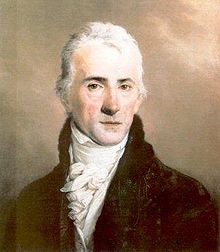music.wikisort.org - Poète
Ferenc Kazinczy ([ˈfɛɾɛnts], [ˈkɒzintsi]), né le à Érsemjén/Șimian, Partium (de nos jours en Roumanie), et mort le à Széphalom[1], est un homme de lettres hongrois.
Dans le nom hongrois Kazinczy Ferenc, le nom de famille précède le prénom, mais cet article utilise l’ordre habituel en français Ferenc Kazinczy, où le prénom précède le nom.
| Naissance |
Érsemjén |
|---|---|
| Décès | 1831, Széphalom |
| Activité principale |
Homme de lettres |
Biographie
Avocat, notaire de comitat, inspecteur scolaire, Kazinczy fut impliqué dans la conspiration jacobine de 1793, condamné à mort et subit un emprisonnement de sept années après que sa sentence eut été commuée.
À sa sortie de prison, cet infatigable réformateur de la littérature et de la langue hongroises consacra sa vie à la cause du renouveau de la langue dans les lettres et l’administration et de la littérature hongroise. Il fut le chef de file des « néologistes » (partisans du renouveau linguistique nyelvújítás), qui enrichirent la langue de quelque 8 000 mots, dont la moitié entra dans le langage courant.
Kazinczy fut l’un des premiers membres de l’Académie hongroise fondée en 1830 et à l’établissement de laquelle il contribua. Il fonda, en 1788, le Magyar Muzeum, le premier écrit périodique publié en hongrois. Ses compatriotes lui doivent en outre des traductions de diverses œuvres des littératures étrangères, puis des poèmes, une tragédie, Lanassa, des récits de voyage, des lettres, etc.
Il a traduit Anacréon, Cicéron, Salluste, La Rochefoucauld, Marmontel, Molière, Shakespeare, Sterne, Lessing, Goethe, Wieland, Klopstock, Ossian, Métastase.
Ses Œuvres ont été réunies (Pest, 1814-1816, 9 vol., et 1843-1844).
Notes et références
- (hu) « Kazinczy Ferenc », sur Petőfi Irodalmi Múzeum - A Magyar Nyelv Múzeuma (Musée de la langue hongroise),
Source
- Gustave Vapereau, Dictionnaire universel des littératures, Paris, Hachette, 1876, p. 1128-9
- Notices d'autorité :
- Fichier d’autorité international virtuel
- International Standard Name Identifier
- CiNii
- Bibliothèque nationale de France (données)
- Système universitaire de documentation
- Bibliothèque du Congrès
- Gemeinsame Normdatei
- Bibliothèque royale des Pays-Bas
- Bibliothèque nationale de Pologne
- Bibliothèque nationale d’Israël
- Bibliothèque universitaire de Pologne
- Bibliothèque apostolique vaticane
- Base de bibliothèque norvégienne
- Bibliothèque universitaire de Zagreb
- Bibliothèque nationale tchèque
- WorldCat
- Portail de la littérature
- Portail des langues
- Portail de la poésie
- Portail de la Hongrie
На других языках
[en] Ferenc Kazinczy
Ferenc Kazinczy (in older English: Francis Kazinczy,[1] October 27, 1759 – August 23, 1831) was a Hungarian author, poet, translator, neologist, the most indefatigable agent in the regeneration of the Hungarian language and literature at the turn of the 19th century.[2] Today his name is connected with the extensive Language Reform of the 19th century, when thousands of words were coined or revived, enabling the Hungarian language to keep up with scientific progress and become an official language of the nation in 1844. For his linguistic and literary works he is regarded as one of the cultural founders of the Hungarian Reform Era along with Dávid Baróti Szabó, Ferenc Verseghy, György Bessenyei, Mátyás Rát and János Kis.[3]- [fr] Ferenc Kazinczy
[ru] Казинци, Ференц
Фе́ренц Кази́нци (венг. Kazinczy Ferenc; 27 октября 1759, Эршемьен (ныне Шимиан, жудец Бихор, Румыния) — 23 августа 1831, Сефалом) — венгерский писатель, общественный деятель, идеолог венгерского Просвещения и реформатор венгерской литературы и венгерского языка.Другой контент может иметь иную лицензию. Перед использованием материалов сайта WikiSort.org внимательно изучите правила лицензирования конкретных элементов наполнения сайта.
WikiSort.org - проект по пересортировке и дополнению контента Википедии
